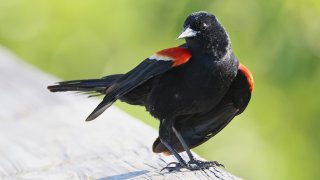
While there’s plenty of attention being paid to the emergence of multiple broods of cicadas this spring, the return of another species will likely send shivers up the spines of many Illinoisans.
That species is the red-winged blackbird, a notoriously aggressive and loud bird species that is known to dive-bomb humans in defense of its nests and mating territories.
According to the Illinois Department of Natural Resources, female red-winged blackbirds typically make their return migration to the state beginning in March and continuing through April, rejoining males that have spent most of the winter in large roosts in the area.
Upon their return, the birds will typically pair off and begin to construct nests, with that process typically lasting through May, according to Cornell Lab of Ornithology.
Feeling out of the loop? We'll catch you up on the Chicago news you need to know. Sign up for the weekly Chicago Catch-Up newsletter here.
While females are tasked with incubating eggs, males become notoriously aggressive in defending those nests, not hesitating to chase off even the largest of predators.
That does indeed include humans, as most Illinoisans can attest to if they’ve happened to have an encounter with a territorial bird.
Nests are typically constructed near marshlands or open grassy areas, though they can also be found near the edges of forests and in ditches, according to IDNR.
Local
Males of the species don’t just spend time at one nest, either. According to the University of Michigan, a male red-winged blackbird’s territory can span more than 2,000 meters, or more than a square mile.
Within that territory a bird can have as many as 15 female nesting partners, though more typically they’ll mate with approximately five females, according to the school.
With territory that large, it’s no shock that the birds can spend up to one-quarter of their daylight hours defending that land, according to Michigan researchers.
Fortunately, all the loud calls and aggressive defense of nests comes with a benefit for humans, as red-winged blackbirds feast on all manner of insects, spiders and other invertebrates.
It’s unclear if their diet includes cicadas, but we will update this story when we get that answer.



